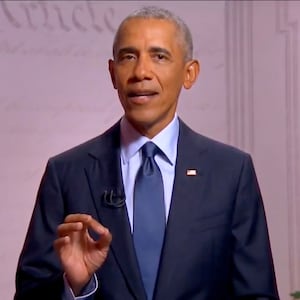If you’re the sort who’s going to read A Promised Land, you won’t leave knowing much more about the first three years of Barack Obama or the first three years of his presidency than you did 700 pages earlier. It’s a book about message control, and a model of it by someone who won the presidency thanks in large part to his mastery of it.
So it’s often Obama’s asides and omissions and ellipses that are most telling, including his repeated nods to how he hadn’t actually accomplished much in politics, besides winning elections, before being elected president, and mentions of the prospect of someone assassinating America’s first Black president.
After the past four years of chaos and governance by tweet and endless articles and books chronicling the present White House’s endless absurd dramas, it’s refreshing to remember how dry and crisp politics can be—with no mention at all of a certain reality TV clown until page 672: “(M)y closest contact with Trump had come midway through 2010, during the Deepwater Horizon crisis, when he’d called Axe [Obama’s nickname for adviser David Axelrod] out of the blue to suggest that I put him in charge of plugging the well. When informed the well was almost sealed, Trump had shifted gears, noting that we’d recently held a state dinner under a tent on the South Lawn and telling Axe that he’d be willing to build ‘a beautiful ballroom’ on White House grounds—an offer that was politely declined.”
ADVERTISEMENT
Detailing his own rise, Obama is refreshingly honest about much of his unlikely ascent (though he only passively notes how his opponents' sealed divorce records kept emerging at serendipitous moments for him), recounting that his speech coming out against the Iraq War in October of 2002, delivered while he was a state Senator representing the South Side of Chicago, was made with an eye to a U.S. Senate run in 2004. He adds, of course, that his position, which would prove to be a crucial point of distinction in the Democratic presidential primary, “reflected my honest beliefs.”
Once elected to the U.S. Senate, “the hype that surrounded me had grown comical,” Obama writes, while claiming, absurdly, about The Audacity of Hope, published weeks after the 2006 midterms, that “I had never intended the book to serve as a campaign manifesto. I just wanted to present my ideas about the current state of American politics in an interesting way and sell enough copies to justify my sizable advance.”
That’s a few pages away from where he writes that “I know that by the spring of 2006, the idea of me running for president in the next election, while still unlikely, no longer felt outside the realm of possibility.” Surveying his prospective 2008 opponents, Obama drily notes that, “(u)nlike me, most of them could point to a record of meaningful legislative achievements.” And, once he started running, “It felt sometimes as if I’d been caught in a tide, carried along by the current of other people’s expectations before I’d clearly defined my own.”
Notably, the book says little about his own expectations, except to say, after noting his campaign rallies had been compared to rock shows, that “I wasn’t offering the crowd a solo performance so much as trying to be a reflector.” And Obama laments that, as the tide rose, “(a)t some basic level, people were no longer seeing me, I realized, with all my quirks and shortcomings. Instead, they had taken possession of my likeness and made it a vessel for a million different dreams,” adding that “if supporters could mold bits and pieces of me into an outsized symbol of hope, then the vague fears of detractors could just as easily congeal into hate.”
But Obama, too, is molding bits and pieces of himself in his memoir, and almost always finding the most generous interpretation. About his “You’re likable enough, Hillary” crack during his epic primary battle with Clinton (“She’s like a fucking vampire,” Obama later quotes David Plouffe grousing as the primary ground on. “You can’t kill her off.”), he insists that was a misinterpreted “overture to my opponent while indicating scorn for the question.” Okay.
In another contortion, Obama writes that Jeremiah Wright — whose ‘Audacity to Hope’ sermon had inspired the title of the presidential candidate’s book and who’d officiated at his wedding and his daughters’ baptisms — was supposed to give the opening invocation on the day he announced his presidential candidacy in 2007. That plan changed after Rolling Stone published a piece where a reporter who’d sat in on a service at Trinity reported that the reverend had said that “We (as in America) believe in white supremacy and Black inferiority and believe it more than we believe in God.”
Trying to split the baby in his recounting, Obama writes that he asked Wright for a private prayer instead and that “I wasn’t surprised that my pastor would point out the gap between America’s professed Christian ideals and its brutal racial history. Still, the language he’d used was more incendiary than anything I’d heard before, and although a part of me was frustrated with the constant need to soften for white folks’ benefit the blunt truths about race in this country, as a matter of practical politics I knew Axe was right” that Wright would have been the leading story on Fox News if he had delivered the invocation as planned.
Whatever those blunt truths about race might be, A Promised Land talks gingerly around them, including with Obama’s assertion, tough to take at face value, that “I may not have been in church for any of the sermons in question or heard Wright use such explosive language” after ABC aired footage, a year after that Rolling Stone story appeared, of Wright preaching about “God damn America” and chickens coming home to roost after 9/11. As Obama concedes, it was “hubris” to think he could “select, as if off a menu, only those things that I liked” about Trinity and Wright.
One fascinating marker of how fraught it’s been for Obama to talk about race came months after he took office, at the June, 2009 press conference on health care where he was asked at the end about the wrongful arrest of 58-year-old Harvard Prof. Henry Louis Gates Jr. after he locked himself out of his house in Cambridge. The police acted “stupidly,” the president said, which they clearly had, but that stray remark swallowed up all the news he’d set out to make, and, Obama writes, “much later I’d learn…that the Gates affair caused a huge drop in my support among white voters, bigger than would come from any single event during the eight years of my presidency. It was support I’d never completely get back.” A few pages later, he notes that there were “reams of (polling) data telling us that white voters, including many who supported me, reacted poorly to lectures about race.”
In at least three separate points in the book, Obama touches briefly on his wife’s concerns about someone assassinating him. First, as a candidate where, “(w)hile campaigning, Michelle—whose great-great-grandfather had been born into slavery on a South Carolina rice plantation—would hear well-meaning Black women suggesting that losing an election might be better than losing a husband, the implication being that if I was elected, I was sure to be shot.”
That fear came up again as Trump’s “birther” filth in 2011 helped Republicans focus their suspicions and resentments of our first Black president:
“Just thinking about Trump and the symbiotic relationship he’d developed with the media made (Michelle) mad. She saw the whole circus for what it was: a variation on the press’s obsession with flag pins and fist bumps during the campaign, the same willingness on the part of both political opponents and reporters to legitimize the notion that her husband was suspect, a nefarious ‘Other.’ She made clear to me that her concerns regarding Trump and birtherism were connected not to my political prospects but, rather, the safety of our family. ‘People think it’s all a game,’ she said. ‘They don’t care that there are thousands of men with guns out there who believe every word that’s being said.’”
In The Promised Land, Obama ties birtherism in with Republican resistance more generally, writing that “…there wasn’t much difference between Trump and Boehner or McConnell. They, too, understood, that it didn’t matter whether what they said was true… the only difference between Trump’s style of politics and theirs was Trump’s lack of inhibition.”
As incisive as Obama’s writing about others can be, he spends a fair amount of space justifying his administration’s decision not to punish any bankers for nearly destroying the world economy, claiming in his high-minded and self-justifying tone that while, for the public, it was tempting to see this as righteous comeuppance for greedy bankers and hedge fund managers,” in fact “the trouble was that in the midst of a financial panic, in a modern capitalist economy, it was impossible to isolate good businesses from bad, or administer pain only the reckless or unscrupulous. Like it or not, everybody and everything was connected.” What chickenshit!
The same instinct to preserve, rather than fundamentally reform, American systems plays out when he writes that because “the actual wars in Afghanistan and Iraq hadn’t involved the indiscriminate bombing or deliberate targeting of civilians that been a routine part of even ‘good’ wars like World War II; and with glaring exceptions like Abu Ghraib, our troops in theater had displayed a remarkable level of discipline and professionalism… as I saw it, then, my job was to fix those aspects of our (counterterrorism) effort that needed fixing, rather than tearing it out root and branch to start over.”
There are a handful of terrific zingers in the book, including Obama’s Yeats-echoing lament that “My supporters lacked all conviction, while my opponents were full of passionate intensity,” and his descriptions of Vladimir Putin (“like a ward boss, except with nukes and a U.N. Security Council veto”) and Lindsay Graham (“You know how in the spy thriller or the heist movie, you’re introduced to the crew at the beginning? Lindsey’s the guy who double-crosses everyone to save his own skin”). Michelle gets credited with a couple of great lines, too, referring to the President’s Daily Brief as “The Death, Destruction, and Horrible Things Book” and offering up that “one of my main goals as First Lady is never to be photographed in a bathing suit.”
My favorite, though, might be former Defense Secretary Robert Gates’ adage that “On any given moment in any given day, somebody somewhere is screwing up.”
And, Obama writes, his administration took great care to limit screw-ups, surely in part because its critics were so eager to find fault with everything it produced, so that “(f)or every event, meeting, and policy rollout, a hundred people or more might be frantically working behind the scenes. Every document issued was fact-checked, every person who showed up for a meeting was vetted, every event was planned to the minute, and every policy announcement was carefully scrubbed to make sure it was achievable, affordable, and didn’t carry the risk of unforeseen consequences.”
I wish I could imagine a sentence like that in any of the books about President Trump, even the cultish hagiographies.
After Obama won the presidency, he writes, he did get one concession from the protective bubble that surrounds a president—a Blackberry that could only communicate with a vetted list of 20 or so contacts, and with the microphone and headphone jack removed so it couldn’t be used as a phone. He compared that to “those play phones you give toddlers, where they get to press buttons and it makes noises and things light up but nothing actually happens.”
If only his successor could have ended up with one of those toddler phones.







